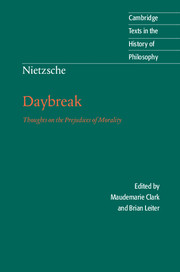Book I
Published online by Cambridge University Press: 05 June 2012
Summary
1
Supplemental rationality. – All things that live long are gradually so saturated with reason that their origin in unreason thereby becomes improbable. Does not almost every precise history of an origination impress our feelings as paradoxical and wantonly offensive? Does the good historian not, at bottom, constantly contradict?
2
Prejudice of the learned. – The learned judge correctly that people of all ages have believed they know what is good and evil, praise- and blameworthy. But it is a prejudice of the learned that we now know better than any other age.
3
Everything has its day. – When man gave all things a sex he thought, not that he was playing, but that he had gained a profound insight: – it was only very late that he confessed to himself what an enormous error this was, and perhaps even now he has not confessed it completely. – In the same way man has ascribed to all that exists a connection with morality and laid an ethical significance on the world's back. One day this will have as much value, and no more, as the belief in the masculinity or femininity of the sun has today.
4
Against the imagined disharmony of the spheres. – We must again rid the world of much false grandeur, because it offends against the justice which all things may lay claim to from us!
- Type
- Chapter
- Information
- Nietzsche: DaybreakThoughts on the Prejudices of Morality, pp. 7 - 56Publisher: Cambridge University PressPrint publication year: 1997



